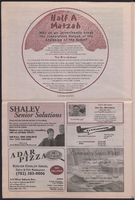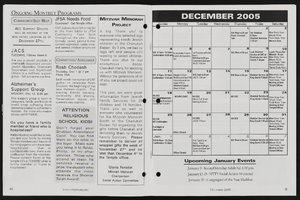Search the Special Collections and Archives Portal
Search Results

Minutes from Temple Beth Sholom Board of Directors meetings, July 1993 - December 1993
Date
Archival Collection
Description
Meeting minutes include reports from committees of the board, correspondence, and balance sheets.
Text

Transcript of interview with Rabbi Mendy Harlig by Barbara Tabach, October 18, 2017
Date
Archival Collection
Description
Known throughout the Las Vegas community as Rabbi Mendy, Mendy Harlig is a leader of the Chabad in Las Vegas, which was introduced to the valley in 1990 by his brother Rabbi Shea Harlig. Since his youth spent growing up in the Crown Heights section of Brooklyn, where he was surrounded by Hasidic Jews, Rabbi Mendy seemed destined to become a Chabad rabbi. During the early 1990s he often visited Las Vegas and assisted his brother at the Chabad of Southern Nevada. Then in 1997 he met and married Chaya Harlig and the couple permanently relocated to the valley to be the spiritual leaders of the Chabad of Green Valley. As their family grew, so did their importance to the Chabad movement in Las Vegas. During this interview, Rabbi Mendy touches upon the nature of Chabad teachings and observance in the so-called “Sin City” persona of Las Vegas. He also shares about his participation in the Las Vegas Metro Chaplaincy program. He particularly reflective of his active role immediately after of the horror of the October 1 mass casualty at the Route 91 country music festival and his perspectives afterwards.
Text

Transcript of interview with Joe Friedman by David Schwartz, May 26, 2015
Date
Archival Collection
Description
Text
Mr. M. Terlizzi Custom Residence, 1993 October 27
Level of Description
Archival Collection
Collection Name: Kenneth H. Childers Architectural Drawings
Box/Folder: Roll 055
Archival Component

Transcript of interview with Lawrence Canarelli by Claytee White, May 1, 2016
Date
Archival Collection
Description
“At five years old, I was the youngest boy at the orphanage. This was the first time that I had lived with indoor plumbing and indoor showers.” To describe award-winning home builder Larry Canarelli as a self-made man is to grossly understate his accomplishments and his determination. Canarelli, founder of American West, Nevada’s largest privately owned development company, learned all about living without shelter as a very young boy. When he was nine years old, Canarelli, the second of his mother’s six children, encouraged his veteran stepfather to buy the family’s first permanent house for $80 down and an agreement to assume payments on the Veterans Administration loan. As his school peers dreamt of large, shiny cars, Canarelli envisaged big, beautiful houses. After self-funding his education, graduating from the University of California Los Angeles, completing two years of U.S. Army service, and earning his Master’s degree from University of Southern California, Canarelli began his career working with a large home building firm in the Los Angeles area. Three years later he switched firms, and the new company sent him to Las Vegas. In this interview, Canarelli reaches back to his childhood to explain his motivation to build houses: “All of my life, I had an interest in housing. Perhaps this is because of never having a house when I was younger.” He recalls how the Collins Brothers helped him when he founded American West. He describes the Southern Nevada “shelter market” of the 1970s and follows its evolution in style and marketing through the 1980s and 1990s; he talks about master planning and the builders who first master planned their Clark County developments: Pardee Homes in Spring Valley, American Nevada in Green Valley, and Howard Hughes Corporation in Summerlin. He speaks to the influences of interest rates and available land on housing prices; the importance of environmentally responsible housing; where the entry-level housing market will go, and ways that technology has changed home building and home buying. And throughout, he exemplifies his devotion to, knowledge of, and respect for Southern Nevada’s housing industry-its builders, its market, and its buyers.
Text

Transcript of interview with Jay Duarte by David G. Schwartz, January 27, 2017
Date
Archival Collection
Description
Text

Transcript of interview with Mike Gausling by David G. Schwartz, December 7, 2016
Date
Archival Collection
Description
Text
UNLV University Libraries Collection of Clark County, Nevada Secured Assessment Publications
Identifier
Abstract
The UNLV University Libraries Collection of Clark County, Nevada Secured Assessment Publications (1992-2000) includes newspaper prints of Clark County, Nevada public records detailing land property information for the upcoming tax year. The Clark County, Nevada secured assessment rolls were created by the Clark County Assessor’s Office and published by the local newspaper of a designated area on or before the beginning of each year.
Archival Collection


